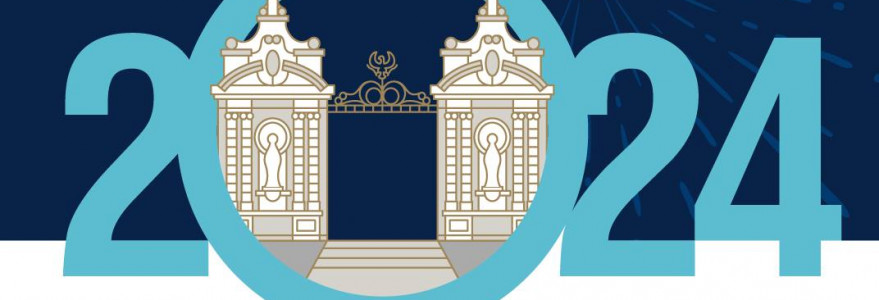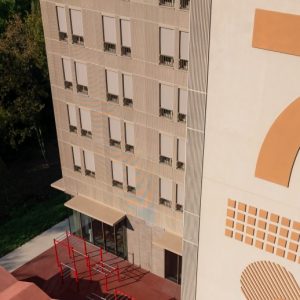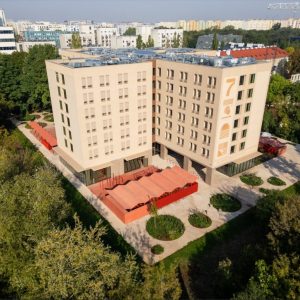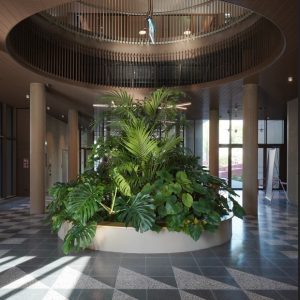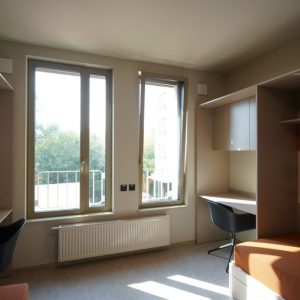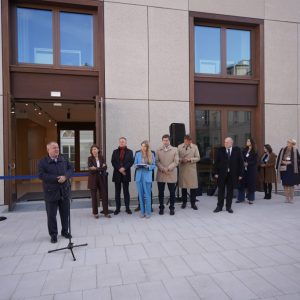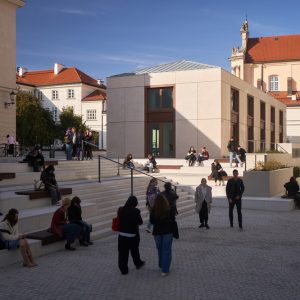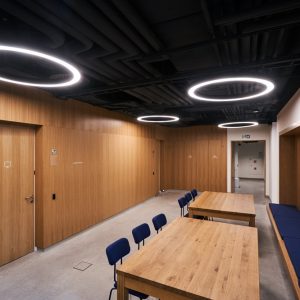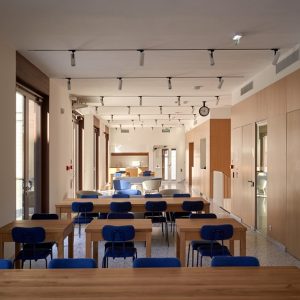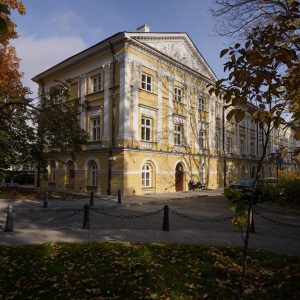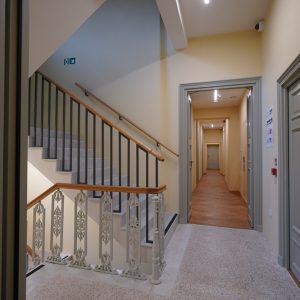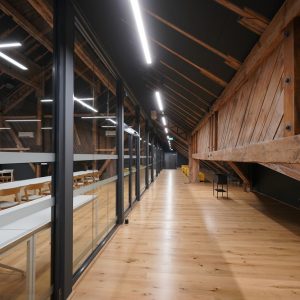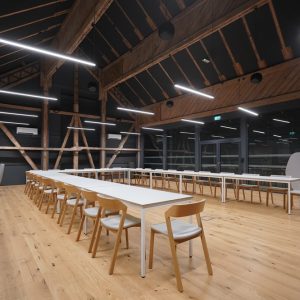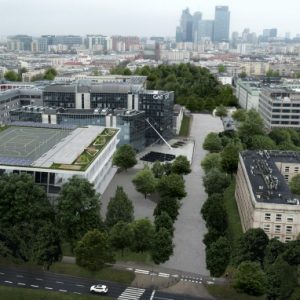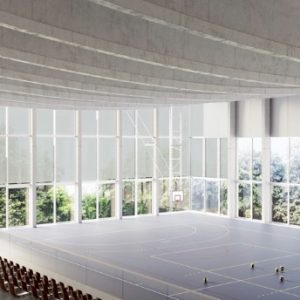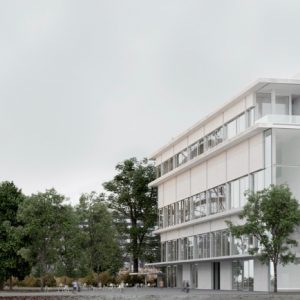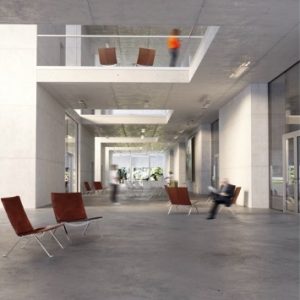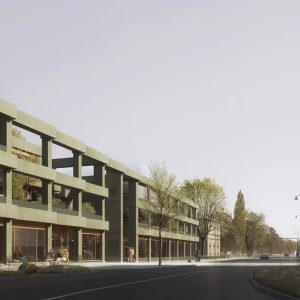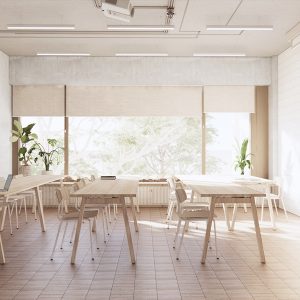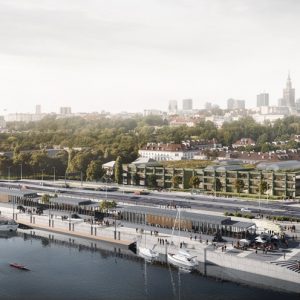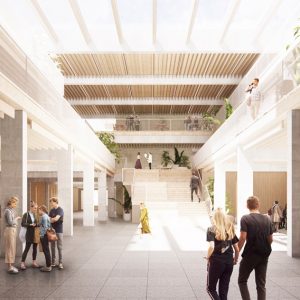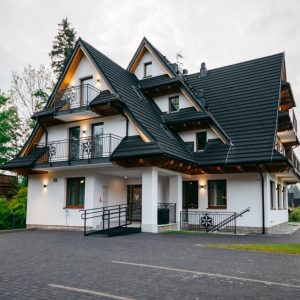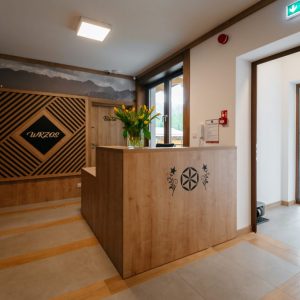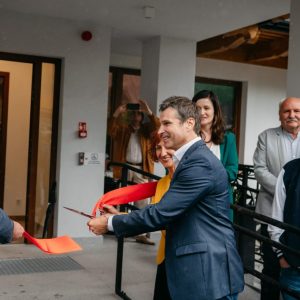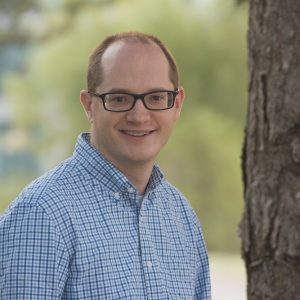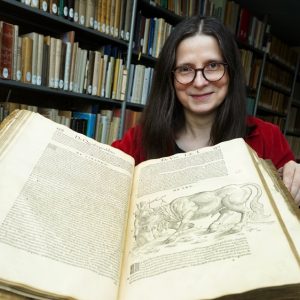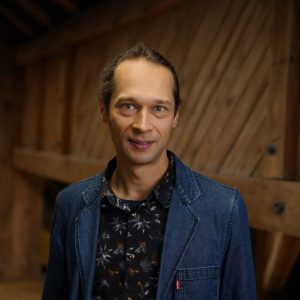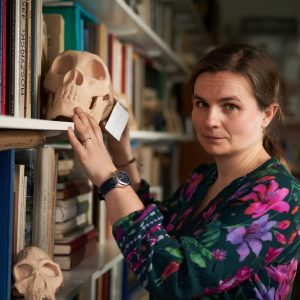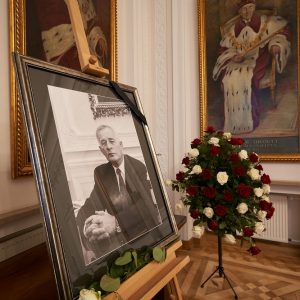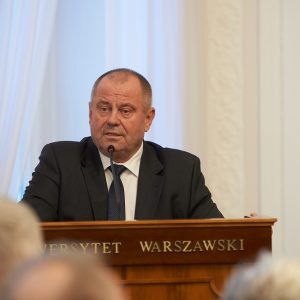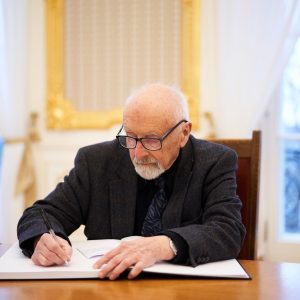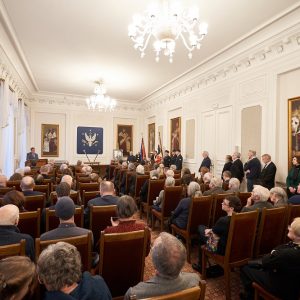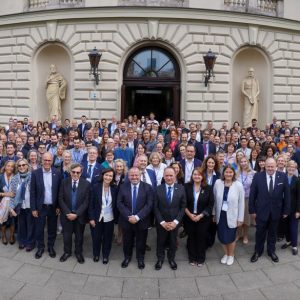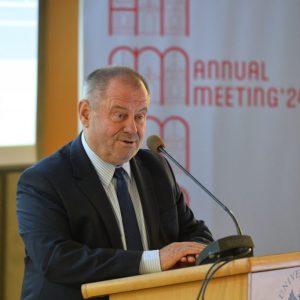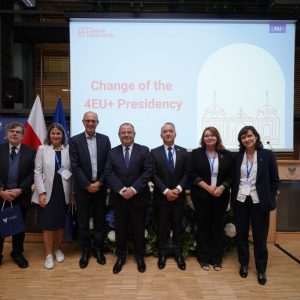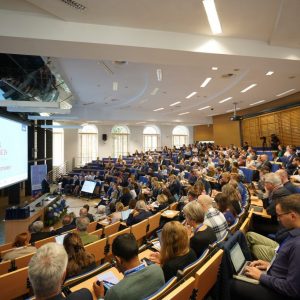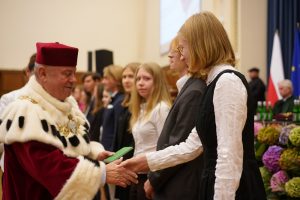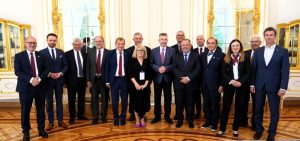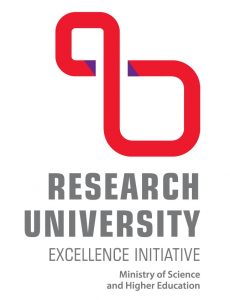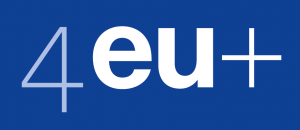Election of the Rector and members of the Senate, new student hall of residence and campus investments, four ERC grant winners, takeover of the 4EU+ Alliance chairmanship, Artificial Intelligence Forum in Karpacz. What else happened in 2024 at the UW? We present a selection of 10 important events for the university.
1. Election at the University
On 18th April, during an election meeting, the UW Electoral College elected Prof. Alojzy Z. Nowak rector of the University of Warsaw. The vote was decided in the first round, in which Prof. Alojzy Z. Nowak received 281 electoral votes, i.e. over 65% of the total. Elections to the UW Senate for the 2024–2028 term were also held on the same day.
2. New investments
On 17th September, there was the opening of the new UW’s student hall of residence, located at Sulimy 4. It has 382 places in single and double rooms. The rooms are either single or combined into segments of two or four rooms. The four-room segments are equipped with a kitchenette and sanitary facilities. Inhabitants of the hall of residence also have a number of common areas at their disposal, i.e. gym, common room, kitchen with dining room, laundry and drying room, work and quiet study spaces. Next to the building there is a sports area, a bicycle room and park alleys. There is underground parking on -1 level. The edifice is characterised by a simple, modern form, designed on a quadrilateral plan resembling a windmill. The building has eight storeys – seven above ground and one underground. The total area of the building is almost 13,000 m² and the usable area is almost 6,000 m². Construction of the hall of residence lasted from December 2021. The total cost of the project was PLN 94.9 million.
The opening of the administration and teaching building in the upper courtyard of the campus at Krakowskie Przedmieście took place on 28th October. The building will house units providing services to candidates for studies as well as related to the internationalisation of the University of Warsaw and support for students, doctoral candidates and employees from abroad during their stay at the University. The total area of the building is 1,400 m². The building has two floors above ground and an underground storey. It contains, for example: ten offices, three workshop rooms, rooms for academic teachers and researchers, a lecture hall with a movable wall that makes it possible to divide the space into two smaller ones, social rooms, a cloakroom, a multifunctional space for lectures and conferences. On the ground floor of the building there is an open space for students.
Two other investments were also completed on the UW Main Campus: the reconstruction of the Former Rector’s building and the attic of the Kazimierzowski Palace. Thanks to the reconstruction of the Former Rector’s building, functional and audiovisual solutions adapted to the needs of education and administrative tasks were introduced in the historic interiors. The implementation of the investment also allowed for improving its accessibility for people with disabilities. The building contains preserved historical elements – staircases, some of the doors, ceilings and windowsills. The former flat of Fryderyk Chopin’s family, which was located in the building, will be transformed into an exhibition space. The Former Rector’s building houses the faculties of Oriental Studies and Culture and Arts.
The investment in the Kazimierzowski Palace allowed for creating a new space on the third floor of the building. It contains, for instance, halls where conferences and meetings can be held, an office space, a social room and technical space.
A reference to the surrounding area, optimum room layout, and a minimalistic means of expression. These features characterise the winning design for the UW Sports Centre building to be constructed in the Ochota district. Of the seventeen entries in the architectural competition concluded on 20th February, the jury gave the highest marks to the idea of the Bureau Babyn Michałowski and Biuro Projektów Lewicki Łatak. The investment is part of the Multiannual Programme “Uniwersytet Warszawski 2016–2027”.
On 14th November, an agreement was signed between the University of Warsaw and the company KARMAR S.A, the general contractor for the investment at Bednarska 2/4. The UW building in Powiśle will be used by students, doctoral candidates and employees of the Faculty of Journalism, Information and Book Studies (PL: WDIB) and the Faculty of Economic Sciences (PL: WNE ). The new building will also house the university’s radio station, Radio Kampus. The building will be constructed on a site located between Bednarska, Dobra, Nowy Zjazd and Wybrzeże Kościuszkowskie streets. It will be connected to the building of former Teodozja Majewska baths, the current headquarters of WDIB. The building will be located next to the Wisłostrada underpass and 300 metres from the pedestrian and bicycle bridge over the Vistula. It will be characterised by a multi-element and multi-faceted façade and the inclusion of greenery in the building structure. Its total area will be almost 19,200 m².
Since 25th May, employees, doctoral candidates and pensioners of the University of Warsaw have been able to take advantage of recreation in the modernised Holiday Home “Wrzos” in Kościelisko owned by the University of Warsaw. On 24th May, a ceremony was held to open the centre after reconstruction. Holiday Home “Wrzos” is located in Kościelisko, at the mouth of the picturesque Kościelska Valley, 8 km from Zakopane. Since 1973, the centre has been managed by the University of Warsaw. It offers a capacity of twenty-eight places, which can be used by employees, doctoral candidates and pensioners of the UW. The centre has been redecorated and extended in recent years. On 24th May, it was officially reopened following the completion of renovation works.
3. Four new ERC grants
The University of Warsaw has secured four new winners of prestigious European Research Council (ERC) grants in 2024.
Prof. Emanuel Gull from the University of Michigan is a theoretical physicist specialising in developing numerical methods to describe complex quantum many-body systems. The European Research Council has awarded him a prestigious Advanced Grant for his project on quantum algorithms. The researcher will move his laboratory from Michigan to Warsaw. This is the first time in the history of our university that a foreign winner of an ERC grant has decided to conduct his research at the University of Warsaw.
Prof. Grażyna Jurkowlaniec from the Faculty of Culture and Arts is the first Polish woman to receive an ERC Advanced Grant. In the SAIGA project, she will analyse the relationship between the research on the fauna of Eastern Europe and the ways in which the region was perceived in the early modern period, i.e. between the 16th and 18th centuries.
An interdisciplinary team of researchers led by Prof. Adam Izdebski from the University of Warsaw has been awarded a prestigious Synergy Grant by the European Research Council (ERC). The EUROpest project: A Novel Understanding of Pandemic Disease in Preindustrial Europe (1300-1800): Combining History, Machine Learning and Natural Sciences will be carried out by a consortium coordinated by the University of Warsaw. This is the first Synergy Grant awarded to the UW.
On 3rd December, the European Research Council (ERC) announced the results of the Consolidator grant competition, of which Prof. Małgorzata Kot from the Faculty of Archaeology at the University of Warsaw was the winner. This is the only Consolidator grant awarded to a Polish institution this year. The subject of the research will be the relationship of hominids that inhabited the Earth as recently as fifty or sixty thousand years ago with modern human.
4. Farewell to Prof. Piotr Węgleński
Prof. Piotr Węgleński was an outstanding scholar, an authority in the world of science and a Man of the University. On 1st February, the UW academic community bid farewell to the university’s long-standing Rector and Vice-Rector. “On the one hand, it is an honour to be able to express respect and remember one’s predecessors, and on the other, it is a great regret to say goodbye to people of great merit; people to whom both the University of Warsaw and the academic community in Poland and abroad owe a great deal. Summing up the life and work of Prof. Piotr Węgleński is not easy. He was a vivid, modest and extremely important figure for the UW. He carried out numerous projects for the development of the university and changed its image in Poland and abroad,” Prof. Alojzy Z. Nowak, the UW Rector, said during a ceremonial meeting devoted to the memory of Prof. Piotr Węgleński.
Information about all the people connected with our university who have passed away in 2024 is available in the university’s magazine: https://www.uw.edu.pl/pismo-uczelni/.
5. Positive IDUB mid-term evaluation
The University of Warsaw, together with the nine other universities that are winners of the “Initiative for Excellence – Research University” programme, was evaluated positively during the IDUB mid-term evaluation. It was conducted in 2023 by an international team of experts. The first competition in the “Initiative for Excellence – Research University” (IDUB) programme was decided by the Ministry of Science and Higher Education in 2019. At that time, ten Polish higher education institutions were awarded, including the University of Warsaw, which was rated the highest of all the applicants. The winners receive an increased subsidy amount of 10 per cent between 2020 and 2026.
6. UW as the most popular university in Poland
In November, the Ministry of Science and Higher Education presented information on enrolment results for the 2024/2025 academic year at universities supervised by the Minister of Science. The University of Warsaw was the most frequently selected university both according to the total number of admissions (as of 1st October 2024 – 9,514; as of 18th October – 11,928) and the applications of candidates for full-time and part-time first-cycle and full-cycle programmes (as of 1st October 2024 – 46,484; as of 18th October – 52,916).
7. European meeting at the UW
More than 300 guests, eight European universities, several dozens of sessions, workshops and meetings. The University of Warsaw hosted a three-day Annual Meeting of the 4EU+ Alliance, of which the UW is a member. On 26th September, Prof. Alojzy Z. Nowak, Rector of the University of Warsaw, took over the chairmanship of the Alliance from Prof. Elio Franzini, Rector of the University of Milan.
The 4EU+ Alliance consists of eight research universities that are jointly building a single European University. For the University of Warsaw, it represents one of the most important strategic initiatives. Through 4EU+, a common educational, research, digital and mobility infrastructure is being built. More than 300,000 students, almost 30,000 doctoral candidates and more than 50,000 employees from Warsaw, Prague, Copenhagen, Heidelberg, Paris, Milan and Geneva have daily opportunities to exchange experiences, carry out joint research or conduct innovative educational projects. In total, more than 240 interuniversity projects have been launched in the Alliance to date.
Every year, the Alliance organises a large-scale wrap-up event – the Annual Meeting – at a different university each year. This year’s edition was organised by the University of Warsaw under the motto: Digital 4EU+. Education – Research – Cooperation. According to the established principle, the presidency of the Alliance is transitive and lasts for one year. During the meeting in Warsaw, the Presidency of the 4EU+ Alliance was ceremoniously handed over to Prof. Alojzy Z. Nowak, Rector of the University of Warsaw.
8. AI Forum in Karpacz
On 18th June, the signing of a cooperation agreement for the implementation of the AI Forum in Karpacz took place in the Golden Hall of the Kazimierzowski Palace. The letter of intent was signed by seven signatories: the University of Warsaw, the Ministry of Digitalisation, Krakow University of Technology, Wroclaw University of Technology, AGH University of Science and Technology and Poznan University of Technology, as well as the Foundation Institute for Eastern Studies – organiser of the Karpacz Economic Forum.
“Science must not only follow, but even anticipate the needs of the modern economy and civilisational development. Modern universities must have links with business and new technologies. We want to educate future entrepreneurs, innovators and market creators. The Artificial Intelligence Forum (AI Forum) in Karpacz serves to support these activities. It is here that we will exchange experiences, identify needs and define common goals, and thus build a competitive economy and international security. Our students and graduates have enormous potential,” Prof. Alojzy Z. Nowak, the UW Rector, said.
“The organisation of the AI Forum during the upcoming Economic Forum in Karpacz is an event of extraordinary importance. In an era of rapid development of artificial intelligence, such a forum is an essential platform for the exchange of knowledge, experiences and best practices between scientists, entrepreneurs and decision-makers,” added Robert Grey, the UW Chancellor. The Artificial Intelligence Forum was held from 3rd to 5th September 2024 as part of the Karpacz Economic Forum. It was one of the largest AI events bringing together prominent experts in the field.
9. Poland in Silicon Valley
On 11th September, the University of Warsaw, together with seven other Polish universities, signed a cooperation agreement with Poland in Silicon Valley Center for Science, Innovation, and Entrepreneurship. Joint activities will include the promotion and publication of research results and cooperation with industry conducted by the university.
10. New research data repositories
Archiving and sharing research data are the main tasks of the institutional repository created by the UW’s Interdisciplinary Centre for Mathematical and Computational Modelling in collaboration with the UW’s Digital Competence Centre. At a meeting held on 12th January, Prof. Zygmunt Lalak, the UW Vice-Rector for Research, inaugurated the new database.
On 27th February, the UW Institutional Repository was inaugurated at the University of Warsaw Library. This is a platform where publications of university employees, doctoral candidates and students are collected and made available.
UW in the media
Every year, the printed press – national and local – as well as television and radio publish more than 20 thousand materials in which the University of Warsaw is mentioned. In online portals, the university appears more than 80 thousand times, and in social media (Facebook, Twitter/X, Instagram) – more than 50 thousand times.
In 2024, the spokesperson and employees of the UW’s Press Office provided around 500 answers to questions from journalists from various editorial offices and the Polish Press Agency. The statements were quoted in a total of around 1,000 materials.
Employees of the UW appear in dozens of press, radio and television materials every week as experts commenting on current events from the world of politics, science, business or culture and the arts. The UW’s Press Office acts as an intermediary between journalists and university employees. The UW’s Press Office maintains a database of experts with entries on around 2,000 scientists.
Press breakfasts were held in October and December, during which UW officials talked to journalists about, for example, investments, research, domestic and international cooperation.
„Czy ja dobrze rozumiem?” is a popular science programme produced by TVP Nauka in cooperation with the UW’s Press Office. In 16 episodes, experts from the University of Warsaw and other entities analyse various topics in the humanities and social sciences in the broadest sense. Some of the recordings were made at the University of Warsaw in such locations as: the attic of the Kazimierzowski Palace, the newly-opened building in the Upper Courtyard of the Main Campus, the Auditorium Maximum, the University of Warsaw Library or the building at Dobra 55. One of the episodes features Prof. Alojzy Z. Nowak, the UW Rector, who talks about the challenges of developing artificial intelligence.



